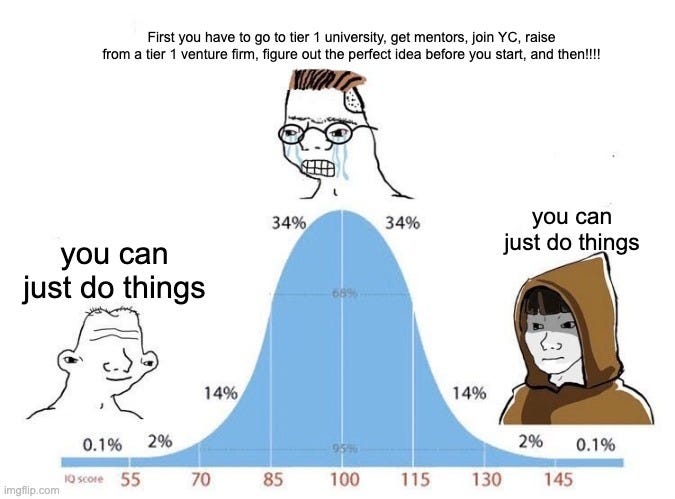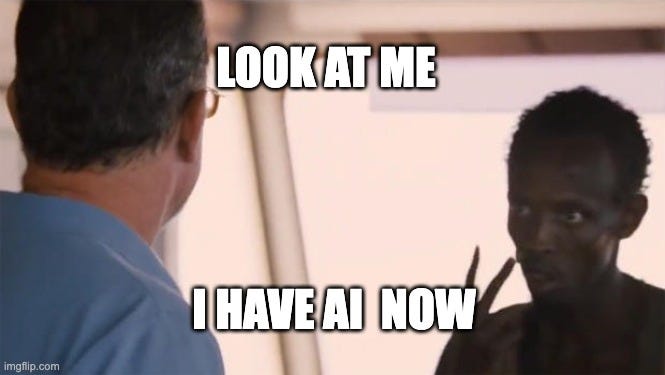Agency is the new superpower
With AI, intelligence is no longer scarce — but agency is. This has implications.
You can just do things.
It’s a catchphrase that’s become a meme among mutuals on social media. At first, it came across to me as typical tech-bro talk. But over time, I’ve come to see a deeper meaning in it. I think it captures something about the era we’re entering and maybe the era we’re already in. I’m calling this the Age of Agency.
I’ve come to believe that agency — the ability to start, decide, act, adapt, and follow through — is rising in importance as AI continues to spread. We’re used to seeing raw intelligence as the ultimate advantage, but something is shifting. Intelligence is now everywhere. It’s on tap. It’s no longer scarce. The rare thing now is the ability and will to use it effectively.

This isn’t just an abstract observation for me. It’s personal. I’ve been wrestling with some education decisions for my son, and I keep circling the same questions: What traits will matter in his future? What do I most want him to develop?
I used to think the answer was in the typical script of elite education, and I still care about a solid educational foundation. But more and more, I find myself thinking about cultivating agency. I want him to be active, adaptable, and street smart in an AI-centered world, not just book smart. I want him morally grounded and capable of critical thinking, too.
And if I’m honest, I’m trying to rediscover agency in myself, too. I’m on the far side of a midlife recalibration — the kind where you realize you’ve been floating a bit, reacting more than initiating, resting on past laurels. In my twenties and thirties, I had more thumos, more spiritedness when it came to acting fast and decisively. I’m trying to reawaken that muscle for my next phase of life.
In human history, every era seems to have its own idea of what makes a person powerful. In the Agricultural Age, it was strength and stamina — the ability to work the land and follow the rhythms of the seasons. In the Industrial Age, it was discipline and conformity. Factories and armies depended on order, obedience, punctuality.
In the Knowledge Age, intelligence became the superpower. The cognitively gifted rose through elite schools into high-status jobs. They picked up STEM skills and became highly paid tech workers. This was the rise of what Charles Murray called the “cognitive elite,” a class sorted by IQ and credentialed into power. This sorting has only intensified in the thirty years since Murray wrote The Bell Curve. Now it’s coded in language about “the educated elite” and “knowledge workers” and “the top 1%.” David Brooks argues it’s evolved into a sort of caste system.
But today, that model is fading. AI can now perform much of the work the knowledge class was trained to do. LLMs can draft legal memos, write code, analyze data, and summarize research. What once required degrees and credentials is now being overtaken by prompts and AI agents. Meanwhile, global markets and off-the-shelf technology are lowering the barriers to building products, starting businesses, and spreading ideas. Intelligence isn’t going away, but it’s no longer scarce.
What’s scarce now is initiative — the ability to turn abundance into impact. That’s why agency is the new superpower, the new force multiplier. I’m not saying intelligence no longer matters. Creativity, vision, critical thinking — these are critical abilities in the Age of Agency. But the most impactful people will not necessarily be the smartest in terms of raw IQ. They’ll be the ones who initiate and execute with competence, the ones who most effectively harness the tools of superintelligence. The high-agency guy with a 120 IQ will be better positioned than the brilliant guy with a 140 IQ who spins in indecision and passivity.
You could argue this is already true in business, and I’d agree. The most successful entrepreneurs and business people aren’t necessarily the smartest. But the managerial tracks that have fueled the upper-middle class have been fed by a credentialed cognitive elite. I expect those priorities to shift toward agency, adaptability, and demonstrated value creation.
In a way, this moment echoes older ideas about human potential. Nietzsche wrote about the will to power and the Ubermensch who embodied it. Goethe’s most powerful line in Faust was: “In the beginning was the deed.” While ideas about agency have sometimes been twisted by authoritarian ideologies — which remains an all-too-present concern — I’m more interested in agency as a vehicle for humanistic ideals that benefit everyone.
Still, with the rise of agency, the stakes of good and evil are higher because it is so much easier to have a scalable impact. And we should be mindful of these shadow sides. The same tools that empower value-creators also empower the destroyers. Somali pirates with exponential tech are no longer science fiction. We’re already seeing it play out on the global stage and in our politics.
Elon Musk embodies the promise and peril of this new era: the rise of the ultra-empowered individual. A kind of Ubermensch crossed with a Bond villain and a buffoon, depending on your perspective. He shows what happens when agency, technology, and scale converge in one person.
The more powerful agency becomes, the more responsibility comes with it. Which brings me back to my son and to education. Schools need to adapt to this new environment, giving kids space to build, explore, and self-direct. But as we cultivate agency, it’s also important that we imbue our culture with a sense of the good, with moral and ethical frameworks, with guardrails. The fuckups of youth — like my friend who experimented with pipe bombs in the school field — can now have a much broader impact in an age of AI, bioweapons, and gene editing.
I have many questions about the implications of the Age of Agency. For example:
How can we reap the upsides of tech while minimizing existential risks?
As agency grows in importance, how might it reshape gender dynamics?
What are the effects on social mobility, inequality, and asymmetries?
How do we sustain social stability and the good life amid accelerated change?
Which forms of human intelligence will AI not surpass?
On a personal level, I am reminded that agency grows through practice, not theory. Cultivating individual agency means starting things before they feel ready. It means having a bias toward action. I’m still retraining my instincts to get back to doing rather than stewing, overthinking, and using parenting and past successes as an excuse. Writing essays is a fun bridge because I get to overanalyze and also ship.
Today, when I see the “You can just do stuff” meme, I think: Yeah, that’s it. That’s the vibe of this new era. Elite credentials and a high IQ are wonderful attributes, but who cares? In a world where intelligence is everywhere, anyone can put points on the board and add to the march of human progress.
You can too. You just have to start.
Related Essays
Other Reading
I love
’s blog. Check out her piece on “how AI will transform college education”- ’s controversial professional network may be a canary in the coal mine for how some are adapting to this new environment
- ’s work on The Pathless Path is worth checking out. I recommend his recent piece, LLMs are dissolving and creating work
Related Note
As I was thinking through these issuse, I shared this note on Substack:
Theme Song
what can I say, I’m basic








I am not really sure who you are or why I ended up as a subscriber. I have found myself disagreeing with a lot of stuff you write (and agree with some, too) but this is excellent. Not something I have really considered, but I agree - with conditions. As someone with an engineering degree from Canada's McGill University (often called the Harvard of the North, Canadian Ivy League certainly) I live in the world of The Knowledge Age and have benefited from it. I am not as concerned/optimistic about the rise of AI, but I think your point is reasonable, it will certainly make raw ability in knowledge less important.
My main comment/observation is that while initiative is King (I think it always has been, mostly - even Bill Clinton made that case to Ohio workers losing manu jobs in the 1990s that the ONLY job security they really had was their ability to take initiative) there are swathes of society caught up in, and promoting, Victim Mindsets (DEI, identity politics, feminism, etc etc) that there are reams of young people today being actively robbed of the awareness that they EVEN have the ability to get themselves out of life's jams.
So while I heartily agree initiative matters more than anything, ESPECIALLY now, lots of people are getting the opposite message.
I am so not concerned with people not using their agency wisely. Right now, our concern has to be with getting people off the floor. I see so many people wanting to be victims now and somehow thinking this gives them power--rather, it is the forfeiting of agency. Of course, we made victimhood the coin of the realm and, well, what did we expect?
It's time to get people to forget how much of a victim they might be (nobody of importance really cares) and get all of us to use our agency and do something.
Then, and only then, should we concern ourselves about using agency wisely. Let's get people to develop their muscle memory first.